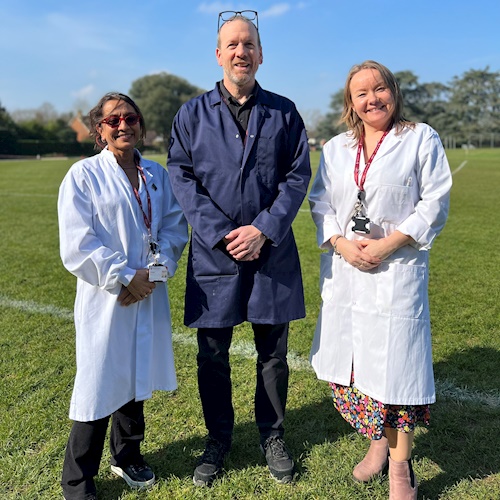
In recognition of TECHOGNITION Day, we chatted to the College's four technicians in this special 'A Conversation With...' feature. TECHOGNITION is a national celebration of technical support staff, that recognises the importance of their essential roles in education and it was wonderful to learn more about Art's Mrs Julie Brooks, DT's Mr Peter Grover, and Science's Dr Hema Patel and Mrs Kasia Gwiazda.
What is your role and how long have you been working at Shiplake College?
Mrs Brooks: I am the technician in the College’s Art and Photography Department and have been working at Shiplake for six years.
Mr Grover: My role is DT Technician, but I also am part of the Maintenance Team. My time is split between these two departments, and I have been working at Shiplake for two years.
Mrs Gwiazda: My role at Shiplake is Senior Science Technician. I joined the College in November 2023.
Dr Patel: I am a Science Technician here at Shiplake and have been working at the College since 2021.
How did you become a technician in your subject?
Mr Grover: I'm not really sure how I became a DT technician as it just seemed to happen! Having spent 22 years working as a furniture/product designer, as well as four years as an apprentice furniture maker, I have lots of experience appropriate for the DT Department as it covers such a varied curriculum.
Mrs Gwiazda: I have a masters and engineering degree in chemistry technology. Since I was at university and had lab practicals, I knew that I would like to work in a lab environment. That and I also get to wear a lab coat is a bonus too!
Dr Patel: Before working here, I was a Fellow at Imperial College for 15 years; I also completed my PhD there. I wanted a part-time job that suited my parent responsibilities, but I also wanted to remain working in science. The role here is perfectly suited for both and I can put my skills to good use working with our pupils.
Mrs Brooks: I love working creatively with colour and design and I also enjoy supporting the teaching staff on a day-to-day basis in any way I can.
What is a day in the life like for you at Shiplake?
Dr Patel: I feel most people don’t know what the role of a Science Technician is, but I essentially support our teaching staff to deliver the practicals. The days are often busy and hectic as I am multitasking with planning, preparing, buying, and managing resources for the experiments across the three major sciences. The science teachers give us requisition sheets for the upcoming week and there can be days where we have up to 10 practicals to organise. There is also some admin work involved where I need to order and plan resources for the year. And of course, keeping up with all of the health and safety regulations!
Mr Grover: No two days are the same in DT. I order everything the department needs to function and I also look after all the machinery and equipment - from hand tools to 3D printers and the laser cutter. I also help our DT teachers during lessons when machinery is being used. I also help our sixth form and Year 11 turn their ideas into reality. The list goes on!
Mrs Gwiazda: My daily duties include preparing, analysing, and calculating chemical solutions, and also setting up practicals as well as clearing them up. I also manage the science schedule for the whole week and often have to place orders for required items such as chemicals and equipment, but also organs and other animal parts from local butchers.
Mrs Brooks: Every day is different. I usually already have a list of tasks but enjoy the unpredictability that working in a school brings. Part of my role is to problem solve - how can the student's ideas best be realised? But I am also preparing resources for lessons, supporting students 1:1, and creating displays of their amazing work.
What is one of the most rewarding (or interesting) things about your role?
Mr Grover: I enjoy seeing students engaged and interested in DT as well as seeing finished projects they are proud of.
Dr Patel: I really enjoy making science engaging for our pupils; everyone should have the opportunity to enjoy the sciences.
Mrs Brooks: To have the opportunity to praise students, especially when they have listened to the excellent advice from their teachers and moved up a level in the quality of their artwork or in their own self-confidence.
Mrs Gwiazda: The most rewarding thing for me is seeing our young scientists develop their skills and knowledge.
















.JPEG/LinseyArmstrongSquare(1)__500x500.JPEG&command_2=resize&height_2=85)


.jpeg/MarcellaHanlonSquare(1)__500x500.jpeg&command_2=resize&height_2=85)

